|
|
|
Sort Order |
|
|
|
Items / Page
|
|
|
|
|
|
|
| Srl | Item |
| 1 |
ID:
106430
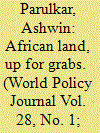

|
|
|
|
|
| Publication |
2011.
|
| Summary/Abstract |
Sheikh Mohammed Hussein Ali Al Amoudi, a citizen of Saudi Arabia, spends his time shuttling between Riyadh and Ethiopia, where he was born in a village 64 years ago. The son of a Yemeni father and Ethiopian mother, Al Amoudi boasts an estimated net worth of $10 billion. He is the richest Ethiopian and, according to Forbes, the 64th richest man in the world. Forty-five years ago, he emigrated to Saudi Arabia and built his fortune in oil refineries and the booming construction industry.
|
|
|
|
|
|
|
|
|
|
|
|
|
|
|
|
| 2 |
ID:
106412
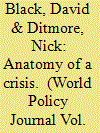

|
|
|
| 3 |
ID:
106421
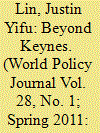

|
|
|
|
|
| Publication |
2011.
|
| Summary/Abstract |
In May 1979, Justin Yifu Lin—a 26-year-old company commander in the army of the Republic of China and a recent graduate of the MBA program at National Chengchi University-defected from Taiwan to mainland China by swimming across the straits to Fujian Province, leaving behind his pregnant wife and three-year-old child. Seven years later, after obtaining a Master's degree in Marxist political economy from Peking University, he became one of the first citizens of the People's Republic of China to receive a PhD in economics from the University of Chicago. Reunited with his family, and returning to China, he became a professor of economics at Peking University and founded the Beijing-based China Center for Economic Research. In June 2008, he became the chief economist of the World Bank, the first ever from a developing country. In a conversation with World Policy Journal editor David A. Andelman and managing editor Justin Vogt, Lin explained his vision of the global recovery and the role of the World Bank in helping developing nations grow and prosper.
|
|
|
|
|
|
|
|
|
|
|
|
|
|
|
|
| 4 |
ID:
106431


|
|
|
|
|
| Publication |
2011.
|
| Summary/Abstract |
Bagua Grande, Peru-Daylight had not yet broken on a remote road outside this small city in the heart of the Amazonian rainforest of northern Peru. But along the narrow strip of highway-known to locals as the Devil's Curve-thousands of protesters were huddled. Most were members of indigenous tribes. It was June 5, 2009, and they had been blocking the highway for two months.
|
|
|
|
|
|
|
|
|
|
|
|
|
|
|
|
| 5 |
ID:
106433
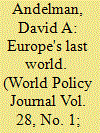

|
|
|
|
|
| Publication |
2011.
|
| Summary/Abstract |
Paris-A hot best seller in France is a curious little work that likely says more than the deepest political commentary about the state of mind in today's Europe, especially this nation that still considers itself-reality perhaps notwithstanding-the heart and soul of the continent. The book is titled Vous N'aurez Pas le Dernier Mot ( You Won't Have the Last Word), and its authors are the writer-actor Jean Piat, of the Comédie Française, and Patrick Wajsman, the founding editor of Politique Internationale. Subtitled "a lighthearted anthology of the sweetest repartées," it seems to have touched a chord this year in a Europe swept by discord, where repartée has taken to the streets-often quite violently-and parliaments are debating how best to reduce expectations.
|
|
|
|
|
|
|
|
|
|
|
|
|
|
|
|
| 6 |
ID:
106429


|
|
|
|
|
| Publication |
2011.
|
| Summary/Abstract |
Port-au-Prince-When the earthquake struck Haiti last January, a lanky 26-year-old woman, who asked to be called Rolonda, gathered her belongings and moved with her mother, her brother and her five-year-old daughter into a field where they would be safe from the aftershocks and falling debris of the capital's crumbling buildings. Rolonda strung up a pair of bed sheets for shelter.
|
|
|
|
|
|
|
|
|
|
|
|
|
|
|
|
| 7 |
ID:
106426
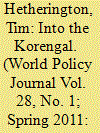

|
|
|
|
|
| Publication |
2011.
|
| Summary/Abstract |
Deep in the Korengal Valley, one of the wildest and most remote stretches of eastern Afghanistan, there flourishes a lucrative trade in timber. This-not opium-is the lifeblood of the local community. In the Korengal, tribal strongmen govern the ancient trade for trees harvested in the lush ridges of the Hindu Kush. But the central Afghan government in Kabul is now attempting to seize control of the timber trade. In doing so, it has earned the enmity of local tribes, who live in near-feudal societies, almost untouched by modernity.
|
|
|
|
|
|
|
|
|
|
|
|
|
|
|
|
| 8 |
ID:
106427


|
|
|
|
|
| Publication |
2011.
|
| Summary/Abstract |
Nicosia-Cradling a skull in her hands, Popi Chrysostomou surveys a sea of bones laid out neatly on tables around her. Some are sorted by type; others form near-complete skeletons. Scores of vertebrae make up a macabre design on one table. On another, bones are tidily arranged into feet.
|
|
|
|
|
|
|
|
|
|
|
|
|
|
|
|
| 9 |
ID:
106422


|
|
|
|
|
| Publication |
2011.
|
| Summary/Abstract |
Sydney-When Lehman Brothers failed in September 2008, Australians felt dangerously exposed to what was locally dubbed the global financial crisis, or the "GFC." Government debt was low and its banks had not indulged in much American-style sub-prime housing lending or dubious financial engineering. But as a capital-importing and commodity-exporting economy, Australia would be highly vulnerable to a seizure in global financial markets and a collapse in world trade. And Australian families had borrowed too much, largely to finance what suddenly looked like a bubble in housing prices. This ultimately showed up in heavy foreign debt channelled through the banking system. Cracks appeared in the second-tier banks, sending a flood of cash into the big banks and under family mattresses.
|
|
|
|
|
|
|
|
|
|
|
|
|
|
|
|
| 10 |
ID:
106419
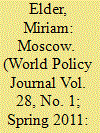

|
|
|
|
|
| Publication |
2011.
|
| Summary/Abstract |
Project MUSE - World Policy Journal - New Capitols of Capital Project MUSE Journals World Policy Journal Volume 28, Number 1, Spring 2011 New Capitols of Capital World Policy Journal Volume 28, Number 1, Spring 2011 E-ISSN: 1936-0924 Print ISSN: 0740-2775 Sub-Article from New Capitols of Capital Moscow:Overcoming a Bad Rap Featuring Miriam Elder on Moscow Return to Article The skyscrapers of Moskva-Citi loom over Soviet-era Moscow like gleaming beacons beckoning a new era. The cluster of high-rises, Moscow's answer to La Defense or Canary Wharf, was born of the pre-financial crisis oil boom, when Russia was keen to use its newfound wealth to catapult itself to the forefront of the global economy. Times have changed, but Moscow's ambitions have not. Dmitry Medvedev, the soft-spoken president who has sought to make subtle liberalization the hallmark of his presidency, first seized upon the idea of transforming the Russian capital into a global financial center two years ago. In recent months, the effort has taken center stage. "Major changes have taken place in Russian society and the Russian economy," Medvedev said in Davos earlier this year, pitching his idea of Moscow as the newest global financial capital to the World Economic Forum. "We are developing and we are moving ahead." Moscow's rapid transformation from the starved center of Soviet demise to the bustling capital of uber-capitalist Russia has produced a sort of urban shock. The gridlocked...
|
|
|
|
|
|
|
|
|
|
|
|
|
|
|
|
| 11 |
ID:
106414


|
|
|
|
|
| Publication |
2011.
|
| Summary/Abstract |
Since the beginning of the global trade in securities, bonds and currencies, three cities have emerged as the world's preeminent money centers: New York (Wall Street), London (The City) and Tokyo. They exert enormous influence on the world's economic agenda, and their cultures subtly shape the world of finance. But today, with the emergence of dynamic economies and societies in the developing world, there has emerged a host of new potential global financial centers. The list is long: Mumbai, Singapore, Hong Kong, Seoul, Dubai, Lagos, Johannesburg. None yet rivals the current
|
|
|
|
|
|
|
|
|
|
|
|
|
|
|
|
| 12 |
ID:
106424


|
|
|
|
|
| Publication |
2011.
|
| Summary/Abstract |
Madrid-Antonio de la Calle, a 46-year-old priest who runs the church of the Patrocinio del Señor in the Vallecas neighborhood, has been playing God to avoid his neighbors' descent into hell. In this working-class neighborhood of more than 300,000 people, the most extreme consequences of the economic crisis roiling Spain are transforming day-to-day life. The door of the church is never locked. Last Easter, a man came in, heated and nervous. "Antonio, I can't stand it any more. You have to help me. For two months I have heard my kid complaining that he is hungry. I've been unemployed for a year and a half. I'm no longer entitled to unemployment payments and my wife isn't eligible for the emergency subsidy. Either you help me or I will start selling drugs at the corner. I cannot take it any longer."
|
|
|
|
|
|
|
|
|
|
|
|
|
|
|
|
| 13 |
ID:
106410
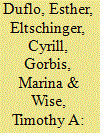

|
|
|
|
|
| Publication |
2011.
|
| Summary/Abstract |
The world is slowly emerging from the economic wilderness of the past three years. What fixes have worked most effectively, and what innovations-sweeping policy reforms, creative business models, analytic insights, bold planning initiatives-hold the most promise for the future? Our panel of global experts weighs in.
|
|
|
|
|
|
|
|
|
|
|
|
|
|
|
|
| 14 |
ID:
106413
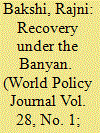

|
|
|
|
|
| Publication |
2011.
|
| Summary/Abstract |
Mumbai-In an acutely ironic twist of history, the financial meltdown of 2008 coincided with the centenary year of Hind Swaraj ( Indian Home Rule), a brief polemical tract written by Mohandas K. Gandhi. On the surface, the essay deals with questions of colonialism and independence. But within his arguments on those matters, Gandhi embedded a deeper, more universal message-that command over our passions is the essence of civilization. Throughout 2009, while business and political leaders scrambled to reboot the global financial system, scholars and activists in many nations met to reflect on the prescience of Gandhi's text. It warned of a danger more fundamental than mere "irrational exuberance" or the "animal spirits" of overconfidence that John Maynard Keynes saw at work decades later. Gandhi would have seen the crisis of 2008 as the inevitable unraveling of a "Black Age" which equates civilization with bodily comforts and advances in technology. "One has only to be patient and it will be self-destroyed," he wrote in Hind Swaraj.
|
|
|
|
|
|
|
|
|
|
|
|
|
|
|
|
| 15 |
ID:
106428


|
|
|
|
|
| Publication |
2011.
|
| Summary/Abstract |
Moscow-When the Soviet Union collapsed, many observers expected its fearsome intelligence apparatus to wither as well. Instead, the post-Soviet era has seen the emergence of an even more influential collection of intelligence organizations that grew out of the two premier Soviet agencies: the KGB, which combined domestic and foreign political intelligence, and the GRU, which handled military intelligence. The prominent-even dominant-role of intelligence within contemporary Russia's political system is a sign of the Kremlin's growing ambitions. But it also reflects a profound fear of being outmaneuvered by the West in Russia's traditional sphere of influence, which now comprises 10 more or less independent nations that once belonged to the Soviet Union. Within that vast territory-and in the areas that directly border it-an intense and largely invisible battle for control is being fought every day.
|
|
|
|
|
|
|
|
|
|
|
|
|
|
|
|
| 16 |
ID:
106420


|
|
|
|
|
| Publication |
2011.
|
| Summary/Abstract |
Project MUSE - World Policy Journal - New Capitols of Capital Project MUSE Journals World Policy Journal Volume 28, Number 1, Spring 2011 New Capitols of Capital World Policy Journal Volume 28, Number 1, Spring 2011 E-ISSN: 1936-0924 Print ISSN: 0740-2775 Sub-Article from New Capitols of Capital São Paulo:The Best-and Worst-of Latin America Featuring Jeb Blount on São Paulo Return to Article Luiz Inacio Lula da Silva spent eight years confounding expectations as the president of Brazil. Perhaps no moment better exemplified Lula's ability to defy easy categorization than his appearance last September at the Bovespa, São Paulo's stock exchange. Lula-a gruff, bearded, working-class leader-was there to celebrate history's biggest-ever sale of stock, a $68 billion offer to government and private investors of new shares in the oil company Petroleo Brasileiro SA, usually known as Petrobras. The sale made Lula-critic of capitalism and champion of the poor -the head of the world's fourth-largest company by market value, a corporate titan nearly the size of ExxonMobil. Even Lula, who was three months from leaving office, seemed surprised by the situation. "Ten years ago I came here and people shook with fear to see me, this devourer of capitalism," Lula told the bankers, brokers and government officials gathered on the floor of the exchange. "Well, this devourer of capitalism is leaving office having honorably participated in the most auspicious...
|
|
|
|
|
|
|
|
|
|
|
|
|
|
|
|
| 17 |
ID:
106417


|
|
|
|
|
| Publication |
2011.
|
| Summary/Abstract |
New Capitols of Capital Shanghai:Looking Inward Featuring Andrew Galbraith on Shanghai Return to Article If you came to Shanghai in the summer of 2010, you would have found a city awash in smiling blue faces. Haibao ("sea treasure") the Gumby-like official mascot of the 2010 Shanghai World Expo, was everywhere. His image was beamed onto giant video screens, stood sentry at intersections, greeted passengers in subway stations, and gazed upon the public from shop windows and the sides of buses. Haibao's ubiquity was not matched by a sense of cultural sensitivity. On the road to the city's Hongqiao Airport stood a "Scottish" Haibao playing bagpipes; a "Latino" Haibao sporting a sombrero, maracas, and wildly rolling eyes; a "Cowboy" Haibao in jeans, boots and a Stetson; and a dazed-looking "Indian" Haibao, a yogi in loincloth and turban. Earlier in the year, Haibao showed up at Hillary Clinton's visit to the groundbreaking of the U.S. Expo pavilion. "I'm originally from Maryland," he said. (The State Department officer hidden inside the mascot costume was feeling chatty.) Expo organizers helpfully explained the symbolism behind each of Haibao's physical traits. His blue body, shaped like...
|
|
|
|
|
|
|
|
|
|
|
|
|
|
|
|
| 18 |
ID:
106411
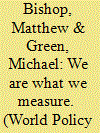

|
|
|
|
|
| Publication |
2011.
|
| Summary/Abstract |
The current economic mess has many alleged causes, from greedy bankers and over-generous Chinese lenders, to financially illiterate home buyers and regulators asleep at the wheel. Yet the crisis also revealed, and was in part due to, the limitations of the economic data we have relied on since the Great Depression. Celebrating ever-rising Gross Domestic Product (and for that matter rising corporate profits and share prices) blinded us to the increasingly serious risks we were taking.
|
|
|
|
|
|
|
|
|
|
|
|
|
|
|
|
|
|
|
|
|